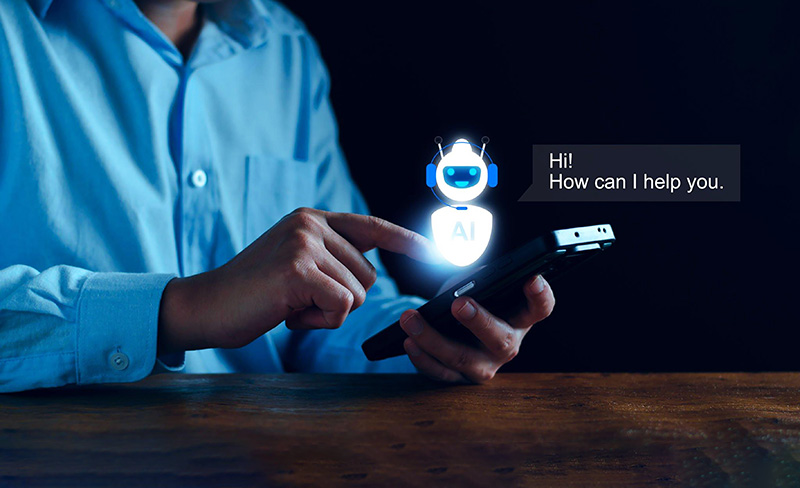When we all used to fantasize that robots would talk in the future, we didn’t know that it wouldn’t be that far in the timeline of technology, from suggesting movies on Netflix to playing a pivotal role in business growth. AI is changing the customer service game.
Think About it- The customer can be scrolling through your products at midnight, and suddenly urge for an instant response to a query, but if your business isn’t available, they’ll simply move on to a competitor who is.
That’s where AI chatbots step in as your brand’s round-the-clock agents; always ready, always responsive.
Customer satisfaction is one of the pillars of brand’s sustainability, and understanding that delayed responsiveness to your customers can lead to frustration and a negative perception of the brand.
But chatbots aren’t just about quick replies. They’re becoming a smart marketing strategy; helping businesses boost growth, cut costs, and create smoother customer journeys. In this blog, we’ll dive into how AI chatbots fuel business growth by making marketing smarter, faster, and more human than ever before.
What are AI Chatbots?
Consider AI chatbots to be the intelligent, pleasant cousins of the traditional chat widgets that you may have used on websites. Rule-based is how traditional chatbots operate, they can do nothing more than follow a set script. If you enter something beyond their pre-defined responses, they are stuck. Annoying, isn’t it?
AI chatbots today are different. With conversational AI and advanced chatbot technology, they truly “understand” the intent behind a customer message. Instead of just repeating a few canned answers, they can have natural, human-like dialogues, can be adjusted to context, and even learn from past conversations.
And that’s why many businesses refer to them as customer service agents, because they don’t just answer your queries, they guide people into exploring the spectrum of options and build relationships. From handling support to igniting interest in customers’ minds, AI chatbots are definitely transforming from mundane tools into reliable partners for customer service.

Why Businesses Need AI Chatbots in 2025?
Always-On Convenience
An omnichannel customer doesn’t follow a fixed hour for browsing, they could be shopping at midnight or looking for a quick support during a lunch break. AI chatbots enable businesses to be there 24/7 with instant answers that prevent customers from straying to the competition.
Cutting Down Costs, Not Quality
It’s too expensive to hire and train large support teams, especially for small businesses that are growing. You can answer thousands of questions at once with chatbot software, without taking a huge hit to your budget. It’s not replacing humans, but actually leveraging the power of AI to do the repeatetive work so your humans can focus on the conversations that absolutely need a human touch.
Smarter Growth, Smarter Conversations
Unlike rule-based robots, conversational AI-based interaction bots learn from experience. They provide personalized recommendations, respond contextually, and even derive valuable customer behaviour insights. This is not just support, it’s a growth driver.
The Trend You Can’t Ignore
By 2025, according to research, over 80% of businesses will be using AI chatbots to enhance customer interactions. That is, chatbots are not the future anymore—they’re the now.

How Different Industries Use AI Chatbots
No matter the industry, AI chatbots blend into workflows to make interactions smoother, smarter, and more human.
E-commerce
For online stores, abandoned carts are like half-written love letters. This is where chatbots for small businesses shine — reminding customers about items they left behind, suggesting alternatives, or even upselling with smart recommendations. Tools like Crisp.chat and Tidio make this process seamless for retailers.
Healthcare
Imagine needing to book an appointment at 2 AM. With AI chatbots for customer service, patients can schedule visits, check symptoms, and get instant answers without waiting on hold. Platforms like HealthTap are already using AI assistants to reduce waiting times and improve patient experience.
Finance
Banks and fintech companies rely on chatbots to answer FAQs, guide customers through loan applications, and send fraud alerts. Cleo is a great example, a friendly chatbot that helps users budget and manage money while keeping the conversation engaging.
Education
Even schools and universities are adopting chatbots. From helping students with enrollment queries to answering common questions about courses, bots act like 24/7 support staff. Many companies using chatbots for marketing in the edtech sector, like Duolingo, add a fun, conversational touch to learning.
Which AI chatbot is best?
When it comes to picking the best chatbot for business growth, the right choice can save you hours of work and bring real business value. Here are the must-have features to look for:
- Your customers are everywhere; Facebook, WhatsApp, Instagram. A good chatbot should connect seamlessly across these channels to keep conversations flowing without breaks.
- Whether it’s your CRM, email software, or e-commerce store, the chatbot should plug in smoothly. This ensures your workflows stay connected instead of Easy integrations adding complexity.
- Beyond conversations, you need insights. A robust dashboard shows which questions customers ask most, where they drop off, and how your chatbot is contributing to sales or support efficiency.
- As your business grows, the chatbot should adapt, whether that means handling more users, offering multilingual support, or adding advanced AI features.

Challenges & Best Practices for Using AI Chatbots
AI chatbots are powerful tools, but they’re not without challenges. Knowing where the risks lie and how to navigate them, ensures businesses maximize their value.
Common Challenges:
- Privacy concerns: Chatbots handle sensitive data, which can raise security issues if not managed properly.
- Lack of human touch: Over-automation can make interactions feel cold and robotic, leading to frustrated customers.
- Poor training: An untrained chatbot may give inaccurate answers, damaging brand credibility.
Best Practices:
- Adopt a Human + AI hybrid model: Let chatbots handle FAQs, while complex cases smoothly transfer to human agents.
- Regularly train and update: Use real customer queries to refine the bot’s responses and improve accuracy.
- Match brand voice: Ensure chatbot tone reflects your company’s personality — whether it’s friendly, professional, or empathetic.
By addressing these challenges with thoughtful practices, businesses can build chatbots that not only solve problems but also strengthen customer relationships.
Future of AI Chatbots in Marketing
The way chatbots are evolving, they won’t just be “support tools” anymore, they’re becoming one of the core marketing channels for brands. Voice bots are making interactions more natural, while AI + AR integration is opening doors to immersive shopping experiences where customers can engage with products in real time.
Another big shift is hyper-personalisation. Instead of generic answers, AI chatbots will learn from past interactions, preferences, and even moods to give recommendations that feel truly personal. For businesses, this means stronger customer engagement and higher conversion rates.
In the next five years, AI chatbots in digital marketing will play a central role in how brands connect, engage, and build loyalty—turning conversations into powerful marketing opportunities.
Conclusion
AI Chatbots have become more than just customer support tools; they have become an engine for business growth. Conversational AI tools help brands to build stronger customer relationships with 24/7 availability for handling queries, guiding buyers and boosting engagement.
The cutting edge is, chatbots allow personalised marketing along with customer journey and integrate with other tools for data-driven campaigns. This shift makes them a core part of digital marketing strategies.
What’s new is how chatbots now enable personalized marketing at scale, streamline customer journeys, and integrate with other tools for smarter campaigns. This shift makes them a core part of digital marketing strategies.
Brands that adopt AI chatbots early will gain a competitive edge, drive higher conversions, and build stronger loyalty. Ready to explore? Start with platforms like Crisp. Chat and take the first step today.

